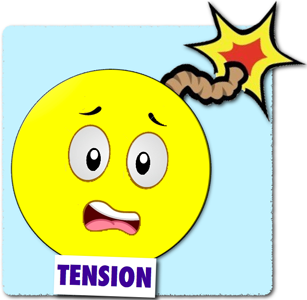Tension

The dramatic term tension identifies a state of uncertainty and lack of knowledge, sometimes also referring to the state of waiting. Tension creates a calculated vagueness over the outcome, an uncertain expectation of an event. The art of delay is therefore a characteristic of tension: Through the retardation of the plot at the peak of a solution, at the moment of confrontation or at the edge of defeat or victory the arc of suspense may be prolonged and tension heightened. The use of a cliff-hanger is quite common. The moment of highest tension in a film is the climax.
A variety of tension effects may be produced depending on the relationship between the states of knowledge of protagonist and audience (please, see suspense and surprise).
In its strict definition the term tension refers to the case that audience and protagonist are at the same level of information.
Suspense
Suspense is the opposite of surprise. It’s based on the audience being set up with crucial information that the character is denied. Suspense is self-affecting and/ or represents dramatic irony as it places the audience in a superior position and provides them with an information head start over the protagonist. Simply suggesting a possible danger doesn’t create suspense though. To achieve a certain effect one needs to stress its possibility, concretise its existential consequences and have its incidence be imminent. Only when the audience has a clearly defined idea of the imminent disaster will their anticipation be activated: the audience will forestall the feared action in their minds. While they’re awaiting the approaching resolution they form specific hypotheses, create expectations and develop a curiosity regarding the further development. Their emotional and intellectual participation is increased. They develop the need to warn the affected character. The audience is in a state of passive control: their helplessness condemning them to watch puts them under mental and physical stress. To know more means to feel more in this case; suspense and empathy advance each other.
Another prerequisite for suspense is that the hope for a happy end is retained. When there’s no hope for salvation left, dramatic pleasure, provided by suspense, is replaced by despair and resignation. The presentiment of a catastrophe and the joyful hope, that the disaster can be warded off, need to be of equal weight.
The state of suspense makes the audience feel caught between the fear of danger, the worry about the protagonist, the anticipation of the resolution and the hope for a turn for the better. Since the audience is aware of bearing witness to a fictional happening, these inner processes constitute an increase in pleasure.
Aristotle already analysed the effects of suspense. He understood suspense as a combination of phobos (anxiety, fear and terror) and eleos (sorrow and compassion). The most famous example for suspense is Hitchcock’s bomb – only the audience knows that it will blow up in just a few minutes. Genres which are defined via the effect of suspense are thrillers and horror movies.
Surprise
Surprise is the opposite of suspense. The way it works is that the audience has less information than certain characters. This state of not-knowing and ‘being in the dark’ leads to a surprising revelation or final twist for the audience. The genre with the greatest use of surprise is the crime story.
It is also possible to combine surprise and suspense: when suspense is resolved in an unexpected way, anticipation comes to nothing and a surprising effect occurs.


[…] the coherence of his character. While these inconsistencies may be deliberate attempts to add dramatic tension, they can also detract from the overall authenticity of his […]
[…] crucial to appreciating the nuances of storytelling. The primary motivation lies in the quest for dramatic tension, thematic resonance, and character development. Real-life events, while often compelling, do not […]
[…] beneath her composed exterior lies a complex emotional landscape that fuels the storyline’s dramatic tension. Portrayed with finesse and a wealth of emotions, Katy Hart encapsulates the struggles, […]
[…] narrative. These tools, when wielded with precision, breathe life into characters, enhance dramatic tension, and elicit laughter. Let’s explore the diverse array of tools at a screenwriter’s […]